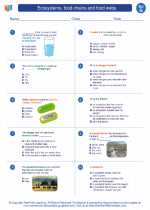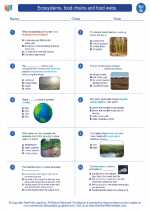Antibodies
Antibodies, also known as immunoglobulins, are proteins produced by the immune system in response to the presence of foreign substances called antigens. They play a crucial role in the body's defense against pathogens such as bacteria, viruses, and other harmful substances.
Structure of Antibodies
Antibodies have a Y-shaped structure composed of four polypeptide chains - two heavy chains and two light chains. Each antibody has a specific region that binds to a particular antigen, known as the antigen-binding site.
Functions of Antibodies
- Neutralization: Antibodies can neutralize toxins produced by bacteria and viruses, preventing them from harming the body.
- Opsonization: They can bind to pathogens, marking them for destruction by phagocytic cells such as macrophages.
- Agglutination: Antibodies can cause pathogens to clump together, making it easier for phagocytic cells to engulf and destroy them.
- Activation of the complement system: Antibodies can trigger the complement system, a group of proteins that work together to destroy pathogens.
Types of Antibodies
There are five main classes of antibodies, each with specific functions:
- IgM: These are the first antibodies produced during an infection and are effective at agglutinating pathogens.
- IgG: The most abundant antibodies in the blood and are involved in long-term immunity.
- IgA: Found in mucous membranes, saliva, and tears, providing protection at body surfaces exposed to the external environment.
- IgE: Associated with allergic reactions and defense against parasitic infections.
- IgD: Found on the surface of B cells and involved in the activation of these cells.
Production of Antibodies
Antibodies are produced by B cells, a type of white blood cell. When a B cell encounters an antigen, it undergoes activation and differentiation into plasma cells, which are specialized to produce antibodies. Some B cells also become memory cells, providing long-term immunity against specific antigens.
Study Guide
Here are some key points to remember about antibodies:
- Understand the structure of antibodies, including the composition of heavy and light chains.
- Learn the functions of antibodies, such as neutralization, opsonization, and agglutination.
- Memorize the five classes of antibodies (IgM, IgG, IgA, IgE, IgD) and their respective roles in the immune system.
- Be familiar with the production of antibodies by B cells and the formation of memory cells for long-term immunity.
◂Science Worksheets and Study Guides Seventh Grade. Ecosystems, food chains and food webs

 Activity Lesson
Activity Lesson
 Worksheet/Answer key
Worksheet/Answer key
 Worksheet/Answer key
Worksheet/Answer key
 Worksheet/Answer key
Worksheet/Answer key
 Vocabulary/Answer key
Vocabulary/Answer key
 Vocabulary/Answer key
Vocabulary/Answer key
 Vocabulary/Answer key
Vocabulary/Answer key
 Vocabulary/Answer key
Vocabulary/Answer key
 Vocabulary/Answer key
Vocabulary/Answer key
